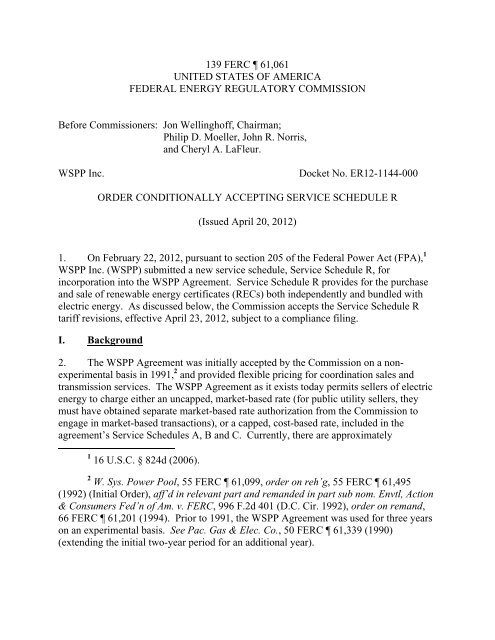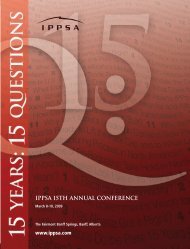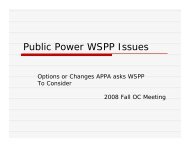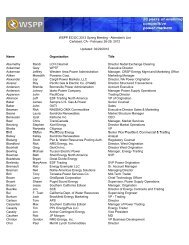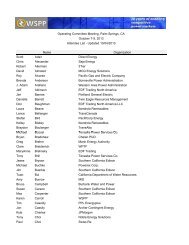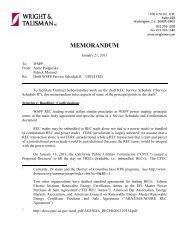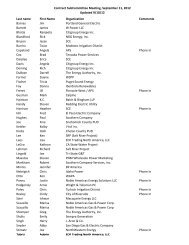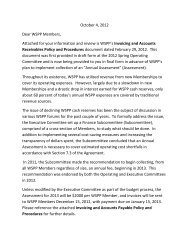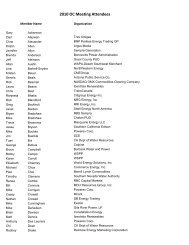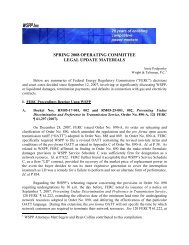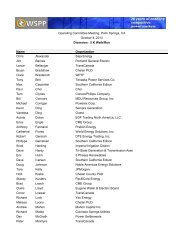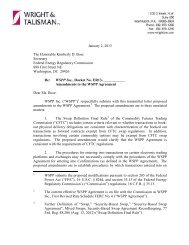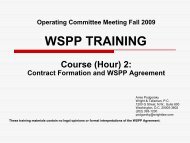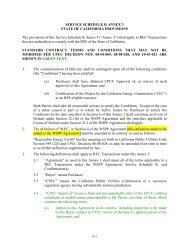FERC Schedule R Order - WSPP
FERC Schedule R Order - WSPP
FERC Schedule R Order - WSPP
You also want an ePaper? Increase the reach of your titles
YUMPU automatically turns print PDFs into web optimized ePapers that Google loves.
139 <strong>FERC</strong> 61,061<br />
UNITED STATES OF AMERICA<br />
FEDERAL ENERGY REGULATORY COMMISSION<br />
Before Commissioners: Jon Wellinghoff, Chairman;<br />
Philip D. Moeller, John R. Norris,<br />
and Cheryl A. LaFleur.<br />
<strong>WSPP</strong> Inc.<br />
Docket No. ER12-1144-000<br />
ORDER CONDITIONALLY ACCEPTING SERVICE SCHEDULE R<br />
(Issued April 20, 2012)<br />
1. On February 22, 2012, pursuant to section 205 of the Federal Power Act (FPA), 1<br />
<strong>WSPP</strong> Inc. (<strong>WSPP</strong>) submitted a new service schedule, Service <strong>Schedule</strong> R, for<br />
incorporation into the <strong>WSPP</strong> Agreement. Service <strong>Schedule</strong> R provides for the purchase<br />
and sale of renewable energy certificates (RECs) both independently and bundled with<br />
electric energy. As discussed below, the Commission accepts the Service <strong>Schedule</strong> R<br />
tariff revisions, effective April 23, 2012, subject to a compliance filing.<br />
I. Background<br />
2. The <strong>WSPP</strong> Agreement was initially accepted by the Commission on a nonexperimental<br />
basis in 1991, 2 and provided flexible pricing for coordination sales and<br />
transmission services. The <strong>WSPP</strong> Agreement as it exists today permits sellers of electric<br />
energy to charge either an uncapped, market-based rate (for public utility sellers, they<br />
must have obtained separate market-based rate authorization from the Commission to<br />
engage in market-based transactions), or a capped, cost-based rate, included in the<br />
agreement’s Service <strong>Schedule</strong>s A, B and C. Currently, there are approximately<br />
1 16 U.S.C. § 824d (2006).<br />
2 W. Sys. Power Pool, 55 <strong>FERC</strong> 61,099, order on reh’g, 55 <strong>FERC</strong> 61,495<br />
(1992) (Initial <strong>Order</strong>), aff’d in relevant part and remanded in part sub nom. Envtl, Action<br />
& Consumers Fed’n of Am. v. <strong>FERC</strong>, 996 F.2d 401 (D.C. Cir. 1992), order on remand,<br />
66 <strong>FERC</strong> 61,201 (1994). Prior to 1991, the <strong>WSPP</strong> Agreement was used for three years<br />
on an experimental basis. See Pac. Gas & Elec. Co., 50 <strong>FERC</strong> 61,339 (1990)<br />
(extending the initial two-year period for an additional year).
Docket No. ER12-1144-000 - 2 -<br />
300 parties to the <strong>WSPP</strong> Agreement located throughout the United States and Canada,<br />
including private, public and governmental entities, financial institutions and aggregators,<br />
as well as wholesale and retail customers. 3<br />
3. The <strong>WSPP</strong> Agreement includes Commission-approved service schedules:<br />
economy energy service (Service <strong>Schedule</strong> A), unit commitment service (Service<br />
<strong>Schedule</strong> B), sale or exchange of firm energy or capacity (Service <strong>Schedule</strong> C), and<br />
seller-specific, cost-based rate schedules (<strong>Schedule</strong> Q).<br />
Description of Filing<br />
4. On February 22, 2012, <strong>WSPP</strong> filed proposed Service <strong>Schedule</strong> R for incorporation<br />
into the <strong>WSPP</strong> Agreement and related conforming changes to the main body of the<br />
<strong>WSPP</strong> Agreement. <strong>WSPP</strong> requests an effective date of April 22, 2012 for Service<br />
<strong>Schedule</strong> R.<br />
5. Under <strong>WSPP</strong>’s proposed Service <strong>Schedule</strong> R, <strong>WSPP</strong> members would be permitted<br />
to sell and acquire three basic REC products, varying in firmness. 4 Each type of REC<br />
product may be transferred independently or bundled with energy. Consequently, <strong>WSPP</strong><br />
proposes three REC products that may be transferred without the associated energy:<br />
(i) Firm REC; (ii) Resource Contingent REC; and (iii) Facility As-Run REC<br />
(collectively, unbundled RECs or unbundled REC transactions). <strong>WSPP</strong> also proposes<br />
three bundled REC products: (i) Firm Bundled REC; (ii) Resource Contingent Bundled<br />
REC; and (iii) Facility As-Run Bundled REC (collectively, bundled RECs or bundled<br />
REC transactions). For both unbundled and bundled REC products, a Firm REC product<br />
requires a seller to deliver, unless there was an uncontrollable force; a Resource<br />
Contingent REC product requires a seller to deliver unless there was an uncontrollable<br />
force or the renewable energy facility was not online to produce energy due to a forced<br />
outage, scheduled maintenance, or a fuel impediment; and a Facility As-Run REC<br />
product requires the seller to deliver unless the designated renewable energy facility is<br />
not online to produce energy. 5<br />
3 <strong>WSPP</strong> Inc., 134 <strong>FERC</strong> 61,169, at P 2 (2011).<br />
4 <strong>WSPP</strong> February 22, 2012 Filing at 3-4 (<strong>WSPP</strong> Filing) (stating that its proposed<br />
levels of firmness—Firm; Resource Contingent; and Facility As-Run—generally<br />
correspond with the firmness levels embodied in <strong>WSPP</strong> Service <strong>Schedule</strong>s C, B and A<br />
respectively).<br />
5 <strong>WSPP</strong> Filing at 4-7.
Docket No. ER12-1144-000 - 3 -<br />
6. Pursuant to <strong>WSPP</strong>’s proposed Service <strong>Schedule</strong> R, the rate caps identified in<br />
Service <strong>Schedule</strong>s A, B, and C would apply to bundled REC transactions. The existing<br />
<strong>WSPP</strong> Agreement provides that such rate caps in Service <strong>Schedule</strong>s A, B, and C do not<br />
apply when the seller “has been authorized to sell power like that provided under [the<br />
agreement] at market-based rates,” or if the seller is not a <strong>FERC</strong>-regulated public utility. 6<br />
Also, as stated in the existing <strong>WSPP</strong> Agreement, the rate caps are subject to the<br />
submission of cost justification by the applicable seller to the Commission, and<br />
acceptance by the Commission of the cost justification. 7 Further, the existing <strong>WSPP</strong><br />
Agreement states that the rate caps are inapplicable in the event that the seller has filed<br />
with the Commission, and the Commission has accepted, a rate schedule applicable<br />
solely to the seller and incorporated into the <strong>WSPP</strong> Agreement at <strong>Schedule</strong> Q. 8<br />
7. In the case of bundled REC transactions, <strong>WSPP</strong> proposes that parties under the<br />
<strong>WSPP</strong> Agreement could elect to either allocate the contract price between the RECs and<br />
the energy components of a bundled REC transaction or elect to use a single, unallocated<br />
price between the RECs and energy. According to <strong>WSPP</strong>, if the parties to a bundled<br />
REC transaction elect to allocate the price, then the relevant rate cap identified in Service<br />
<strong>Schedule</strong>s A, B, and C would apply solely to the price of the energy component. If,<br />
however, the parties do not allocate the price between the REC and energy components,<br />
<strong>WSPP</strong> states that those rate caps, without modification, would apply to the unallocated<br />
price as though it were a price solely for electric energy. 9<br />
8. <strong>WSPP</strong> asserts that the terms and conditions of Service <strong>Schedule</strong> R are just and<br />
reasonable. 10 Specifically, <strong>WSPP</strong> states that the proposed tariff provisions are “expected<br />
to foster efficiency, promote liquidity, and aid in the development and liquidity of<br />
competitive markets for the purchase and sale of RECs.” 11 Further, <strong>WSPP</strong> contends that<br />
Service <strong>Schedule</strong> R would establish standard terms governing a variety of transactions<br />
while allowing parties to include transaction-specific terms.<br />
6 <strong>WSPP</strong> Agreement at A-3.6, B-3.5, C-3.5.<br />
7 <strong>WSPP</strong> Agreement sections A-3.7, B-3.6 and C-3.6; see also W. Sys. Power Pool,<br />
122 <strong>FERC</strong> 61,139 (2008).<br />
8 Id.<br />
9 <strong>WSPP</strong> Filing at 4-7.<br />
10 Id. at 11.<br />
11 Id.
Docket No. ER12-1144-000 - 4 -<br />
9. <strong>WSPP</strong> requests that the Commission confirm that unbundled REC transactions are<br />
not subject to the Commission’s jurisdiction because such transactions do not include the<br />
sale or purchase of electric energy for resale. As such, <strong>WSPP</strong> argues that unbundled<br />
REC transactions “do not affect or relate to rates and charges for transmission or sale of<br />
energy.” 12 Moreover, <strong>WSPP</strong> contends that the Commission’s reasoning in other matters<br />
supports the conclusion that unbundled REC transactions are not subject to the<br />
Commission’s jurisdiction. 13 For instance, <strong>WSPP</strong> states that the Commission has<br />
previously found that qualifying facilities can contract for the purchase or sale of RECs<br />
separately from power sales under the Public Utility Regulatory Policies Act of 1978. 14<br />
<strong>WSPP</strong> also asserts that the Commission has held that the sale of RECs by an exempt<br />
wholesale generator in the normal course of its business is “an activity incidental to its<br />
business of owning and operating the eligible facility and selling electricity at<br />
wholesale.” 15 Finally, <strong>WSPP</strong> argues that unbundled REC transactions are distinct and<br />
independent of wholesale sales of electricity and analogous to emission allowances, the<br />
sale of which the Commission has found are not subject to FPA section 205 review. 16<br />
II.<br />
Notice of Filings and Responsive Pleadings<br />
10. Notice of <strong>WSPP</strong>’s Filing was published in the Federal Register, 77 Fed. Reg.<br />
12,826 (2012), with interventions and protests due on or before March 14, 2012. The<br />
California Department of Water Resources State Water Project and the City of Santa<br />
Clara, California, the City of Redding, California and the M-S-R Public Power Agency<br />
filed timely motions to intervene. The North Carolina Utilities Commission (North<br />
Carolina Commission) filed a notice of intervention and comments.<br />
11. The North Carolina Commission states that it supports <strong>WSPP</strong>’s request that the<br />
Commission confirm its lack of jurisdiction over REC transactions. The North Carolina<br />
12 Id. at 12 (citing section 205 of the FPA).<br />
13 Id. at 12-13 (citing Smoky Hills Wind Power Project II, LLC, 125 <strong>FERC</strong><br />
62,286 (2008) (delegated letter order); Am. Ref-Fuel Co., 105 <strong>FERC</strong> 61,004, at P 23<br />
(2003); Madison Windpower, LLC, 93 <strong>FERC</strong> 61,270 (2000); Edison Elec. Inst.,<br />
69 <strong>FERC</strong> 61,344 (1994)).<br />
14 Id. at 12 (citing Am. Ref-Fuel Co., 105 <strong>FERC</strong> 61,004 at P 23).<br />
15 Id. (quoting Madison Windpower, LLC, 93 <strong>FERC</strong> 61,270 at 61,871).<br />
16 Id. at 13 (quoting Edison Elec. Inst., 69 <strong>FERC</strong> 61,344).
Docket No. ER12-1144-000 - 5 -<br />
Commission adds that the Commission’s jurisdiction does not extend to either bundled or<br />
unbundled REC transactions.<br />
III.<br />
Discussion<br />
A. Procedural Matters<br />
12. Pursuant to Rule 214 of the Commission’s Rules of Practice and Procedure,<br />
18 C.F.R. § 385.214 (2011), the notice of intervention and timely, unopposed motions to<br />
intervene serve to make the entities that filed them parties to this proceeding.<br />
B. Substantive Matters<br />
13. The Commission accepts the proposal to incorporate the proposed Service<br />
<strong>Schedule</strong> R into the <strong>WSPP</strong> Agreement, subject to a compliance filing, effective April 23,<br />
2012. 17 We note that <strong>WSPP</strong>’s proposed Service <strong>Schedule</strong> R has received broad support.<br />
The <strong>WSPP</strong> Operating Committee voted in favor of adding Service <strong>Schedule</strong> R to the<br />
<strong>WSPP</strong> Agreement, which requires agreement among 90 percent of the voting members. 18<br />
14. The Commission supports the <strong>WSPP</strong>’s efforts to facilitate the purchase and sale of<br />
RECs among <strong>WSPP</strong> members and finds the proposed Service <strong>Schedule</strong> R is consistent<br />
with the original objective of the <strong>WSPP</strong> Agreement “to capture economic benefits which<br />
were not already covered under existing agreements.” 19 By incorporating a service<br />
schedule through which RECs can be transferred, the <strong>WSPP</strong> Agreement can be used to<br />
17 The 60-day notice period required by section 205(c) of the FPA and section 35.3<br />
of the Commission’s regulations, 18 C.F.R. § 35.3 (2011), starts to run on the first day<br />
after the date of filing. Thus, absent a request for waiver of the Commission’s notice<br />
requirements, the earliest date a filing may become effective is the day after the 60-day<br />
notice period has expired. Thus, for <strong>WSPP</strong>’s Filing, which was filed on February 22,<br />
2012, the 60th day of the notice period is April 22, 2012, and the earliest permissible<br />
effective date, without suspension, is April 23, 2012, rather than April 22, 2012, as<br />
proposed by <strong>WSPP</strong>. See Utah Power & Light Co., 30 <strong>FERC</strong> 61,015, at 61,024 n.9<br />
(1985).<br />
18 See <strong>WSPP</strong> Filing at 2.<br />
19 W. Sys. Power Pool, 55 <strong>FERC</strong> 61,099 at 61,314, order on reh’g 55 <strong>FERC</strong><br />
61,495 (1992).
Docket No. ER12-1144-000 - 6 -<br />
increase efficiency and liquidity in RECs sales, which should benefit market<br />
participants. 20<br />
15. In a bundled REC transaction, when the contract price is allocated separately<br />
between energy and RECs, <strong>WSPP</strong> proposes that the rate caps included in the existing<br />
<strong>WSPP</strong> Agreement apply to the price of the energy component. When the contract price is<br />
not separately allocated between RECs and energy, <strong>WSPP</strong> proposes that the rate caps<br />
would apply to the single contract price. <strong>WSPP</strong> adds that if the application of the rate cap<br />
to the single contract price is insufficient to cover the costs for the transaction, then the<br />
member can propose a new price cap for inclusion in the filed <strong>Schedule</strong> Q. 21 The<br />
Commission finds this method of addressing the rate cap to be just and reasonable<br />
because when the contract price is separately allocated between energy and RECs the cap<br />
will apply to the energy rate consistent with the original application of the rate cap. Also,<br />
if the parties to a bundled REC transaction do not separately allocate the price between<br />
energy and RECs, the cap applies to the single price, and parties can file with the<br />
Commission to revise their rate cap. Thus, <strong>WSPP</strong> members have the opportunity to<br />
attempt to adjust their rate cap if necessary.<br />
16. Nevertheless, the provision included in proposed sections R-2.3.2., 2.3.4(b),<br />
2.3.6(b) of the <strong>WSPP</strong> Agreement to apply the rate cap to bundled REC transactions is<br />
unclear. The proposed provision states, “If the Contract Price is allocated between the<br />
REC and the Energy, the hourly rate caps identified in Section [C-3.6, B-3.6, A-3.7] shall<br />
apply to the Contract Price for the Energy.” As proposed, the rate caps would be required<br />
to apply to all bundled REC transactions that allocate the price between RECs and<br />
energy, even if the transaction is subject to an exception, for instance, when the seller has<br />
market-based rate authorization. Accordingly, we direct <strong>WSPP</strong> to make a filing, within<br />
30 days of the date of this order, clarifying that the rate caps do not apply when the seller<br />
has market-based rate authority and when the seller is not a <strong>FERC</strong>-regulated public<br />
utility. Further, although <strong>WSPP</strong> states that the rate caps would also apply to bundled<br />
REC transactions that do not allocate between RECs and energy, the proposed provisions<br />
do not make that explicit. Thus, <strong>WSPP</strong>’s compliance filing should also make clear that<br />
the rate caps do apply to REC transactions that do not allocate the contract price between<br />
RECs and energy and are not subject to the exceptions discussed above.<br />
17. <strong>WSPP</strong> requests that the Commission confirm that transactions for unbundled<br />
RECs that take place under proposed Service <strong>Schedule</strong> R of the <strong>WSPP</strong> Agreement, which<br />
do not include a sale of energy, are outside of the Commission’s jurisdiction. The North<br />
20 See Id. at 61,313.<br />
21 <strong>WSPP</strong> Filing at 5 n.9.
Docket No. ER12-1144-000 - 7 -<br />
Carolina Commission requests that the Commission confirm its lack of jurisdiction over<br />
REC transactions, and asserts that the Commission’s jurisdiction does not extend to either<br />
bundled or unbundled REC transactions.<br />
18. As discussed below, we conclude that unbundled REC transactions fall outside of<br />
the Commission’s jurisdiction under sections 201, 205 and 206 of the FPA. We further<br />
conclude that bundled REC transactions fall within the Commission’s jurisdiction under<br />
sections 201, 205 and 206 of the FPA.<br />
19. Pursuant to section 201(a) of the FPA, the Commission is charged with regulating<br />
the transmission of electric energy in interstate commerce and the sale of electric energy<br />
at wholesale in interstate commerce. 22 Section 201(b) of the FPA confers jurisdiction on<br />
the Commission over the transmission of electric energy in interstate commerce, sales of<br />
electric energy at wholesale in interstate commerce and the facilities for such<br />
transmission or sale of electric energy. 23 FPA section 201(e) defines the term “public<br />
utility” for purposes of the FPA, stating that a public utility is “any person who owns or<br />
operates facilities subject to the jurisdiction of the Commission.” 24 “Facilities” may<br />
include contracts, accounts, memoranda, papers, and other records, insofar as they are<br />
utilized in connection with wholesale sales. 25 For example, the Commission considers<br />
contracts for wholesale energy sales (sometimes referred to as “paper” facilities) to be<br />
jurisdictional facilities, and thereby regards as public utilities “power marketers” that do<br />
not own or operate generating plants or transmission lines, but that enter into contracts<br />
for wholesale energy sales. 26<br />
20. Section 205(a) of the FPA charges the Commission with ensuring that “rates and<br />
charges made, demanded or recovered by any public utility for or in connection with the<br />
transmission or sale of electric energy . . . and all rules and regulations affecting or<br />
22 16 U.S.C. § 824(a).<br />
23 Id. § 824(b).<br />
24 Id. § 824(e).<br />
25 See Hartford Elec. Light Co., 131 F.2d 953, 961 (2nd Cir. 1942); Golden Spread<br />
Elec. Coop., 39 <strong>FERC</strong> 61,322, at 62,022 (1987), reh'g denied, 40 <strong>FERC</strong> 61,348<br />
(1987).<br />
26 Citizens Energy Corp., 35 <strong>FERC</strong> 61,198, at 61,452-53 (1986).
Docket No. ER12-1144-000 - 8 -<br />
pertaining to such rates or charges [are] just and reasonable.” 27<br />
requires every public utility to file with the Commission<br />
FPA section 205(c)<br />
schedules showing all rates and charges for any transmission or sale subject<br />
to Commission jurisdiction, and the classifications, practices, and<br />
regulations affecting such rates and charges together with all contracts<br />
which in any manner affect or relate to such rates, charges, classifications<br />
and services.[ 28 ]<br />
FPA section 206(a) gives the Commission authority over rates and charges for<br />
jurisdictional sales as well as “any rule, regulation, practice, or contract affecting such<br />
rate, charge, or classification” to ensure that they are just and reasonable and not unjust,<br />
unreasonable, unduly discriminatory or preferential. 29<br />
21. RECs are state-created and state-issued instruments certifying that electric energy<br />
was generated pursuant to certain requirements and standards. Thus, a REC does not<br />
constitute the transmission of electric energy in interstate commerce or the sale of electric<br />
energy at wholesale in interstate commerce. Therefore, RECs and contracts for the sale<br />
of RECs are not themselves jurisdictional facilities subject to the Commission’s<br />
jurisdiction under FPA section 201.<br />
22. Nevertheless, although a transaction may not directly involve the transmission or<br />
sale of electric energy, the transaction could still fall under the Commission’s jurisdiction<br />
because it is “in connection with” or “affects” jurisdictional rates or charges. 30 As courts<br />
have noted, “there is an infinitude of practices affecting rates and services.” 31 Courts<br />
have also provided some guidance regarding the limits of the Commission’s jurisdiction,<br />
finding that the Commission’s jurisdiction is limited to “those methods or ways of doing<br />
things on the part of the utility that directly affect the rate or are closely related to the<br />
rate, not all those remote things beyond the rate structure that might in some sense<br />
indirectly or ultimately do so.” 32<br />
27 16 U.S.C. § 824d(a).<br />
28 Id. § 824d(c).<br />
29 Id. § 824e(a).<br />
30 Id. § 824d.<br />
31 City of Cleveland, Ohio v. <strong>FERC</strong>, 773 F.2d 1368, 1376 (D.C. Cir. 1985).<br />
32 Cal. Indep. Sys. Operator Corp., 372 F.3d 395, 403 (D.C. Cir. 2004).
Docket No. ER12-1144-000 - 9 -<br />
23. In Edison Electric Institute, the Commission explained that the sale or transfer of<br />
an emissions allowance may “affect” the rates a utility charges “for or in connection<br />
with” jurisdictional service. 33 Thus, if a wholesale sale of electric energy by a public<br />
utility requires the use of an emissions allowance, that sale, and the cost of allowances in<br />
connection with it, is subject to review under section 205. 34 But the Commission added<br />
that if the sale or transfer occurs independent of a sale of electric energy for resale in<br />
interstate commerce, it is outside of Commission review under FPA section 205 (unless a<br />
public utility seeks to flow through the costs in wholesale rates). 35<br />
24. Similarly, when an unbundled REC transaction is independent of a wholesale<br />
electric energy transaction, we conclude, based on available information, that the<br />
unbundled REC transaction does not affect wholesale electricity rates, and the charge for<br />
the unbundled RECs is not a charge in connection with a wholesale sale of electricity.<br />
Thus, an unbundled REC transaction that is independent of a wholesale electric energy<br />
transaction does not fall within the Commission’s jurisdiction under sections 201, 205<br />
and 206 of the FPA. In a bundled REC transaction, however, where a wholesale energy<br />
sale and a REC sale take place as part of the same transaction, RECs are charges in<br />
connection with a jurisdictional service that affect the rates for wholesale energy. Thus,<br />
the Commission has jurisdiction over the wholesale energy portion of the transaction as<br />
well as the RECs portion of a bundled REC transaction under FPA sections 205 and 206<br />
(regardless of whether the contract price is allocated separately between the energy and<br />
RECs).<br />
25. The Commission notes that its jurisdictional determination regarding unbundled<br />
RECs does not affect the existing obligations of parties to the <strong>WSPP</strong> Agreement. For<br />
instance, the parties to a transaction under the <strong>WSPP</strong> Agreement remain subject to<br />
applicable, mandatory and enforceable bulk power system operating requirements set<br />
forth in the North American Electric Reliability Corporation’s reliability standards. 36<br />
Similarly, this determination on jurisdiction does not address the extent of the<br />
33 69 <strong>FERC</strong> 61,344 at 62,289.<br />
34 Id.<br />
35 Id.<br />
36 16 U.S.C. § 824o; see also <strong>WSPP</strong> Agreement section 13 (“The Agreement and<br />
all Confirmations are subject to valid laws, orders, rules and regulations of duly<br />
constituted authorities having jurisdiction.”).
Docket No. ER12-1144-000 - 10 -<br />
Commission’s jurisdiction under the market manipulation prohibition included in<br />
section 222 of the FPA. 37<br />
26. The Commission further notes that parties cannot avoid Commission jurisdiction<br />
by simply separating a bundled REC transaction so that the sale of energy and the REC<br />
sale are included in separate documents. Contracting parties cannot avoid Commission<br />
jurisdiction by splitting a unified agreement into separate agreements, one for the sale of<br />
unbundled RECs and one for the sale of energy. 38 Contract interpretation rules permit<br />
that where multiple instruments, executed contemporaneously or at different times,<br />
pertain to the same transaction, they will be read together, even if they do not expressly<br />
refer to each other. 39<br />
The Commission orders:<br />
(A) The Commission hereby accepts <strong>WSPP</strong>’s proposed Service <strong>Schedule</strong> R,<br />
subject to a compliance filing, to be effective April 23, 2012, as discussed in the body of<br />
this order.<br />
(B) <strong>WSPP</strong> is hereby directed to submit a compliance filing in this docket within<br />
30 days, as discussed in the body of this order.<br />
By the Commission.<br />
( S E A L )<br />
37 16 U.S.C. § 824v.<br />
Nathaniel J. Davis, Sr.,<br />
Deputy Secretary.<br />
38 Nat’l Gas Pipeline Co. of Am., 85 <strong>FERC</strong> 61,322, at 62,262 (1998) (stating that<br />
a party “cannot avoid the Commission’s filing requirement by splitting a unified<br />
agreement also involving nonjurisdictional services into two or more separate contract<br />
documents.”)<br />
39 See Kurz v. United States, 156 F. Supp. 99, 104 (S.D.N.Y. 1957); Peterson v.<br />
Miller Rubber Co. of New York, 24 F.2d 59, 62 (8th Cir. 1928); Hampton Roads Shipping<br />
Assoc. v. Int’l Longshoreman’s Assoc., 597 F. Supp. 709, 716 (E. D. Va. 1984).


